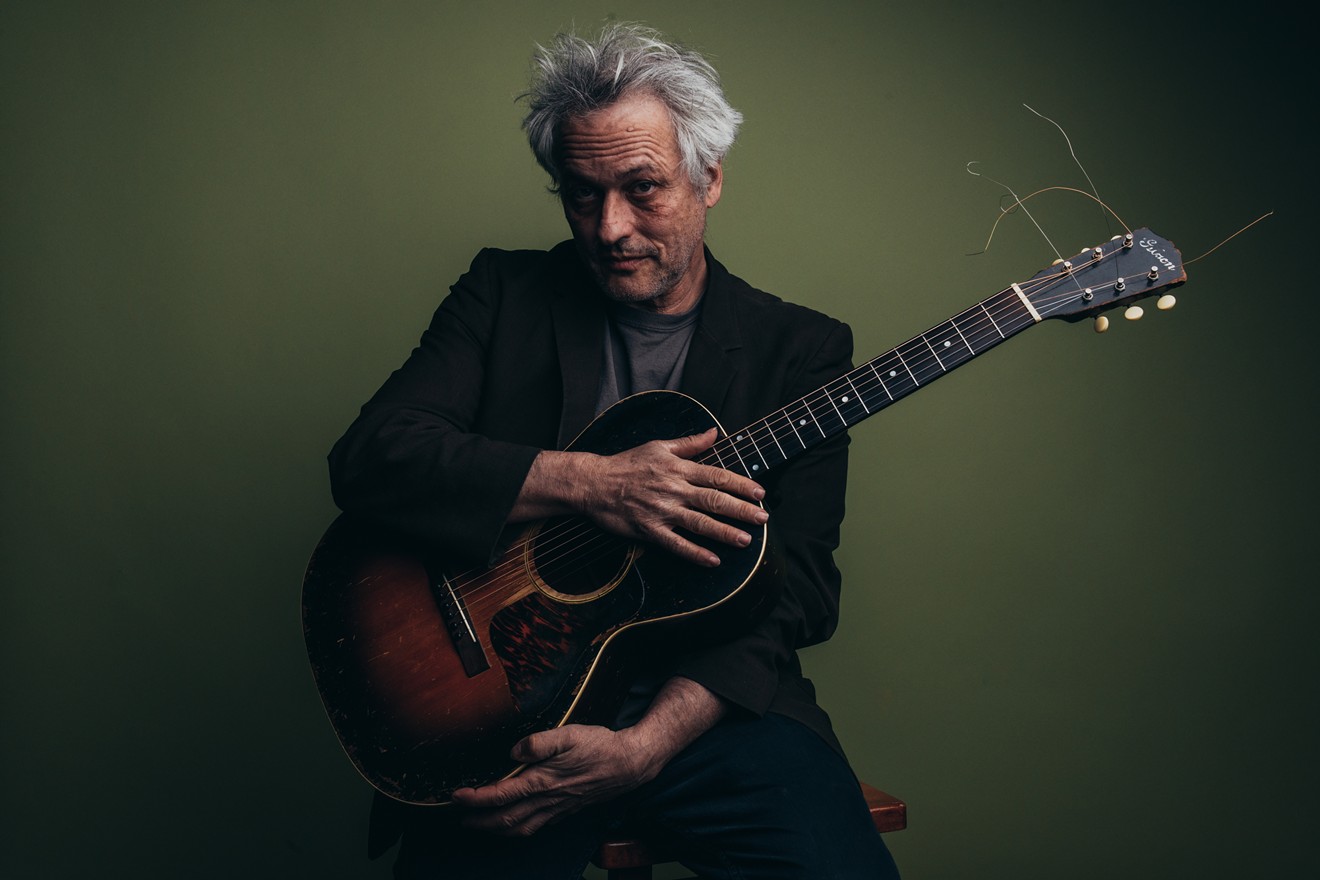Guitarist Marc Ribot, who's worked with heavies like Tom Waits and Elvis Costello, says playing music is all about what you do with your limitations, and playing acoustic guitar, which he'll do when he plays two solo sets at Dazzle this Saturday, has definite limitations.
"But it’s what you do with them that matters," Ribot says. "If all you have is six strings, then you start on one of them and really quiet, and by the time you’re banging out all of them, that gives you a whole lot of range to create some music.”
When he plays solo shows, 63-year-old Ribot says he feels free to call on his entire music history. And that dates back to his beginnings on classical guitar at the age of ten, through his work as a sideman from '79 through ’85 with legends like Brother Jack McDuff, Wilson Pickett, Chuck Berry and others, a four-year stint with the Lounge Lizards and numerous collaborations with New York’s downtown avant-garde musicians like John Zorn.
Along the way, Ribot has recorded nearly two dozen albums under his name that show the wide-reaching scope of his guitar skills. He has an homage to Cuban composer Arsenio Rodriguez with his group Marc Ribot y Cubanos Postizos, an exploration of the music of avant-garde saxophonist Albert Ayler with Spiritual Unity, and a jaunt into Philly soul with the Young Philadelphians. His affinity for punk and no wave are evident in Rootless Cosmopolitans.
So, during his solo shows, he plays whatever bubbles to the surface at the moment. There’s no set list, and he does different things – sometimes radically different things – every night.
“I just try to do in front of an audience what I do when I’m sitting in my studio,” Ribot says, “which involves a certain amount of memory of pieces I’ve played in the past, or standards or folk tunes or TV commercials, and then a large amount of improvisation, which includes a certain kind of playing with those motifs and memories.”
Over the nearly two decades that Ribot has embarked on solo acoustic tours, things have evolved quite a bit, he says. In the early 2000s, he was playing an Audition guitar (“this kind of challenged, almost toy guitar”) that he borrowed from Marc Anthony Thompson (also known as Chocolate Genius), who bought it on the street. “So far, I’ve borrowed it for around 25 years,” he says, “so I hope he doesn’t ask for it back.” While he says that guitar has a very particular beauty, he's since switched to his "very old" Gibson.
Around the time he started performing solo, he was playing pieces from Zorn’s The Book of Heads, a set of 35 etudes for solo guitar.
“Those are extended technique pieces that call for violin bows, alligator clips, balloon rubbing, banging, squeaking the body of the guitar, playing behind the bridge, playing behind the nut, putting false bridges, like a pencil, on the strings,” Ribot says “There’s a lot of stuff. When you really start thinking of different ways to torture a guitar ... the list is almost endless.”
While Ribot hasn’t performed many pieces from The Book of Heads lately, he says, “Once you’ve done that stuff, it kind of becomes part of the repertoire. It becomes part of just how you think, and it’s definitely part of how I think. So, yeah, sonic events tend to happen.”
Ribot says the way he plays is shaped by things he’s done, but also the musicians he’s worked with who use noise, atonality and polytonality.
“All these things came up in the people who I was playing with,” Ribot says, “not to mention just plain old rudeness. But it’s not because I studied formally, but people like Albert Ayler and Ornette Coleman I was influenced by. And not to mention a bunch of a punk rockers were using those elements as well, and no wavers. So, it all rubbed off, and it’s all there in the mix, as can be playing a standard.”
Ribot has released six solo albums (including his most recent, 2010’s Silent Movies), each of which were quite different, and he says he’s currently working on several other projects at the same time, one of which is a solo/vocal record that’s “not strictly solo guitar, and it’s not strictly vocals.” He says he's mostly done with it, but he’s just waiting on copyright clearances for translating some songs before he can release it.
He’s also working on a political album dubbed Songs of Resistance, which he hopes to record this summer and release sometime in the fall. He says it’s inspired by the current state of affairs, and he’d be turning his mind to “other things were it not for the Trump regime.”
“I’ve been on a number of protests, and what I noticed was that I think we’re faced with a challenge to democracy,” he says. “And I think that people need to get out and protest and have. But I’ve noticed that when people are marching, they don’t seem to have access to our musical traditions of protest.
“I’ve taken certain tunes from the Civil Rights movement and others from the partisan movement in Europe during World War II and then some originals and then a few tunes from other places in the world. For example, there’s a Paquita la del Barrio tune from Mexico. She’s a Mexican romantic ballad singer, but this tune is so raw. It’s called ‘Rata de los Patas” – “Rat With Two Legs.” And I’m telling you, the lyrics are so brutal it makes the Dead Kennedys seem nice by comparison.”
Marc Ribot, 6:30 and 9 p.m., Saturday, July 1, Dazzle, 1512 Curtis Street, $15-$25.
[
{
"name": "Air - MediumRectangle - Inline Content - Mobile Display Size",
"component": "12017618",
"insertPoint": "2",
"requiredCountToDisplay": "2"
},{
"name": "Editor Picks",
"component": "17242653",
"insertPoint": "4",
"requiredCountToDisplay": "1"
},{
"name": "Inline Links",
"component": "18838239",
"insertPoint": "8th",
"startingPoint": 8,
"requiredCountToDisplay": "7",
"maxInsertions": 25
},{
"name": "Air - MediumRectangle - Combo - Inline Content",
"component": "17261320",
"insertPoint": "8th",
"startingPoint": 8,
"requiredCountToDisplay": "7",
"maxInsertions": 25
},{
"name": "Inline Links",
"component": "18838239",
"insertPoint": "8th",
"startingPoint": 12,
"requiredCountToDisplay": "11",
"maxInsertions": 25
},{
"name": "Air - Leaderboard Tower - Combo - Inline Content",
"component": "17261321",
"insertPoint": "8th",
"startingPoint": 12,
"requiredCountToDisplay": "11",
"maxInsertions": 25
}
]












